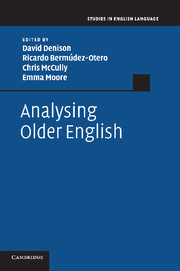Book contents
- Frontmatter
- Contents
- Figures and maps
- Tables
- Contributors
- General introduction
- Part I Metrics and onomastics in older English
- Part II Writing practices in older English
- 5 Introduction to Part II
- 6 Anglian features in late West Saxon prose
- 7 ‘ea’ in early Middle English
- Part III Dialects in older English
- Part IV Sound change in older English
- Part V Syntax in older English
- References
- Index
5 - Introduction to Part II
Published online by Cambridge University Press: 05 December 2011
- Frontmatter
- Contents
- Figures and maps
- Tables
- Contributors
- General introduction
- Part I Metrics and onomastics in older English
- Part II Writing practices in older English
- 5 Introduction to Part II
- 6 Anglian features in late West Saxon prose
- 7 ‘ea’ in early Middle English
- Part III Dialects in older English
- Part IV Sound change in older English
- Part V Syntax in older English
- References
- Index
Summary
All the papers collected in this volume pay careful attention to the demands of contemporary historical linguistics on the one hand and philology on the other. That is, the papers are poised between diachronic and synchronic; between an acute awareness of real and ostensible linguistic change and the theoretical compulsions of uniformitarianism; between the twin challenges provided by those narratives which describe linguistic history and the textual fidelities vital to sustain a vibrant philology. The fruitful analytical tensions caused by such demands are seen to clear effect in R. D. Fulk’s contribution here.
Fulk offers a scrupulous analysis of some Anglian features in late West Saxon. He shows that earlier hypotheses as to the history, form and occurrence of these features need re-examination, largely because there is no ‘one-size-fits-all’ description that would account for the distribution of those Anglian features in late West Saxon (lWS) prose. Instead, the occurrence of such features may be ascribed to:
the existence of Anglian originals which underwent successive recensions or redactions in (l)WS;
a possible ‘Anglian prose tradition before Alfred in which the occasional use of poetic terms was deemed appropriate to homiletic prose’;
that the scribes recording lWS prose were Mercian by birth, and that therefore Mercian features were native to them;
the fact that in lWS we might (on sociolinguistic grounds) expect there to be ‘a constant flux of both additions and deletions of Anglian features’. Fulk draws a somewhat telling parallel here with the forms of modern English dialects, none of which are in any describable sense ‘uniform’.
The chapter, then, consists of a review of the evidence for 1–4 above, proceeding particularly carefully in its identification of Anglian features as these occur (or do not occur) in parallel texts, before concluding that the ‘flux’ hypothesis – 4 – would prima facie seem best to represent the linguistic position pertaining in the extant lWS texts, this view gaining in theoretical legitimacy by its underpinning in the uniformitarian principle (Labov 1972; see also Fulk, this volume, p. 65 and note 3).
- Type
- Chapter
- Information
- Analysing Older English , pp. 59 - 62Publisher: Cambridge University PressPrint publication year: 2011

